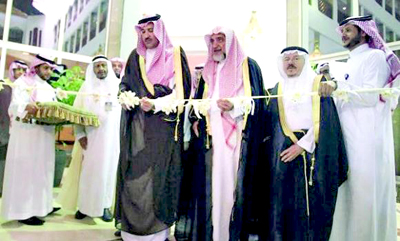 Madinah, Nov 26: Madinah Gov. Prince Faisal bin Salman inaugurated an international seminar, entitled “The Printing and Publication of the Holy Qur’an: Realities and Objectives,” in Madinah on Tuesday.
Madinah, Nov 26: Madinah Gov. Prince Faisal bin Salman inaugurated an international seminar, entitled “The Printing and Publication of the Holy Qur’an: Realities and Objectives,” in Madinah on Tuesday.
The forum was organized by the King Fahd Qur’an Printing Complex at Le Meridien Hotel in the holy city and was conducted under the aegis of Custodian of the Two Holy Mosques King Abdullah.
The prince also cut a tape to open an exhibition on the sidelines of the forum and toured the expo, which showcased various publications of the Holy Qur’an, its manuscripts and other printed literature at the complex.
Islamic Affairs Minister Saleh Al-Asheikh and other guests accompanied the prince. The prince was also presented with a new exclusive copy of the Holy Qur’an and the first edition of the holy book in braille.
Al-Asheikh briefly outlined how the Qur’an was first compiled and sent to major Muslim powerhouses during the time of the third caliph, Uthman bin Affan.
“Scribes went to great lengths to copy the verses exquisitely and with precision throughout the centuries,” he said.
“Even after the invention of printing machines, hand-written copies of the Qur’an remained the versions of choice since scholars feared errors at printing houses and preferred to stick to traditional artistic techniques.”
The King Fahd Qur’an Printing Complex was soon to be established, nevertheless, and copies printed within the establishment were scrutinized using advanced technological methods.
“More than 230 million copies of the holy book have been printed at the complex,” he said.
“Other publications printed at the complex include studies and literature on the holy book, including commentaries and meanings in various languages. The Qur’an has been translated into 63 languages, while close to 300 million copies of Qur’an-related literature have been printed by the complex.”
“The seminar comes as a affirmation to all those who are interested in such mechanisms since printing the Qur’an is no easy task,” Al-Asheikh said. The minister also commended the keenness of King Abdullah, Crown Prince Salman, deputy premier and minister of defense, and Deputy Crown Prince Muqrin to support the printing complex.
Muhammad Al-Oufi, secretary-general of the complex, also spoke on the occasion.
He said the goals of the forum included laying down codes of reference and formulating an optimum method for printing and proofing the holy book, in addition to facilitating a meeting between experts on the Qur’an.
Ahmed Shukri of the University of Jordan lauded the efforts made by the country in printing, publishing and distributing flawless and free copies of the Qur’an to Muslims around the globe.






Comments
Add new comment